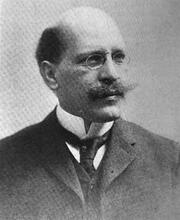Hugo Münsterberg
Pioneer of Applied Psychology in Industrym Law, Medicine and Education

Hugo Münsterberg came to Harvard in 1892 with a doctorate in psychology, earned under the supervision of Wilhelm Wundt at the University of Leipzig, and a medical degree from the University of Heidelberg. Having already established the second psychology laboratory in Germany, Münsterberg was recruited by William James to assume leadership of Harvard’s experimental psychology lab. Although he briefly went back to Germany in 1895, Münsterberg returned to a full professorship at Harvard in 1897 and spent the rest of his career at the university. In 1898 he was elected the president of the American Psychological Association.
Münsterberg believed in psychological parallelism, a theory that views the body and mind as an inextricable unit, with physical processes always occurring in tandem with brain processes. His early experimental work focused on sensation and perception, but by the early 1900’s his focus shifted to applying the techniques of psychological research to practical questions specific to industry, the law (e.g., the psychological factors affecting juries and trial outcomes), education (e.g., attention and fatigue), and clinical psychiatric practice. Many of Münsterberg’s works, such as On the Witness Stand (1908), Psychotherapy (1909), and Psychology and Industrial Efficiency (1913) widely influenced successive generations of practitioners and researchers.
“If experimental psychology is to enter into its period of practical service, it cannot be a question of simply using the ready-made results for ends which were not in view during the experiments. What is needed is to adjust research to the practical problems themselves and thus, for instance, when education is in question, to start psychological experiments directly from educational problems.” (On the Witness Stand, pp. 8-9).
Münsterberg’s life was sadly cut short; in 1916 he died suddenly, in the midst of delivering a lecture. By furthering the cause of experimental psychology and extending its domain to practical applications, his influence endured much longer.
Sources
Münsterberg, H (1908). On the witness stand: Essays on psychology and crime. New York: Doubleday.
Münsterberg, M. (1922). Hugo Münsterberg, his life and work. New York: D. Appleton & Co.